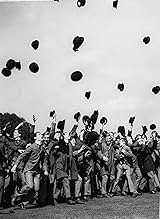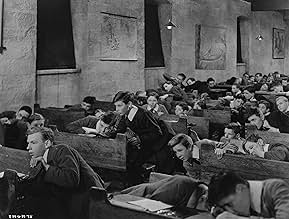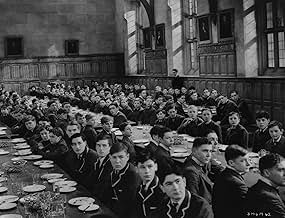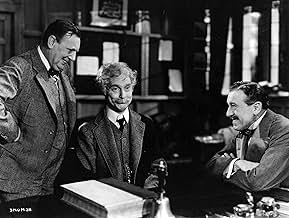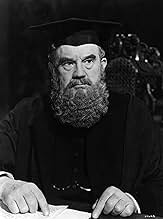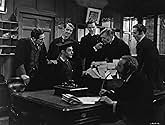IMDb RATING
7.9/10
12K
YOUR RATING
An aged teacher and former headmaster of a boarding school recalls his career and his personal life over the decades.An aged teacher and former headmaster of a boarding school recalls his career and his personal life over the decades.An aged teacher and former headmaster of a boarding school recalls his career and his personal life over the decades.
- Won 1 Oscar
- 6 wins & 8 nominations total
Paul Henreid
- Staefel
- (as Paul Von Hernried)
Edmund Breon
- Colonel Morgan
- (as Edmond Breon)
Ernest Blyth
- Austrian Officer Boarding Train
- (uncredited)
John Blythe
- Boy Calling Assembly
- (uncredited)
Featured reviews
Amongst those movies that aim to use straightforward human drama alone to tell a thoughtful story, "Goodbye, Mr. Chips" is one of the finest. Robert Donat's performance gives you not just one character to remember, but several, as he convincingly portrays Chipping's different personas at different stages of his life.
Greer Garson is also excellent in her role, and Paul Henreid gets some good scenes as well. These relationships and others throughout the movie make for a believable and memorable portrayal of the title character, and also of the world in which he lived. The story is well-written, and it includes a very good variety of material, showing the characters dealing with everything from eager anticipation to grave concern, from blissful joy to great sorrow, and much in between.
The panorama from generation to generation also works well, showing both change and stability as time passes. While only a handful of scenes contain weighty material, all of it is thoughtful, and much of it memorable. It keeps everything balanced and believable, and it's been a good while since any movie of its kind has worked so well.
Greer Garson is also excellent in her role, and Paul Henreid gets some good scenes as well. These relationships and others throughout the movie make for a believable and memorable portrayal of the title character, and also of the world in which he lived. The story is well-written, and it includes a very good variety of material, showing the characters dealing with everything from eager anticipation to grave concern, from blissful joy to great sorrow, and much in between.
The panorama from generation to generation also works well, showing both change and stability as time passes. While only a handful of scenes contain weighty material, all of it is thoughtful, and much of it memorable. It keeps everything balanced and believable, and it's been a good while since any movie of its kind has worked so well.
Director Sam Woods (`Kitty Foyle: The Natural History of a Woman,' `King's Row,' `For Whom the Bell Tolls') 1939 film `Goodbye Mr. Chips' features a top-notch performance by Robert Donat as the somewhat stuffy English prep school teacher, Mr. Chippings. Chippings early career difficulties are overcome, as is his shyness after he meets Greer Garson (`Mrs. Miniver') in the Alps while on holiday. Garson is able to show the stodgy Chips how to live life and her effect on him lasts throughout the rest of his life, although Garson is not around for long.
The film uses recurring patterns to show the passage of time, namely the showing of the boys arriving at the school each year in the autumn. These segments often contained little historical snippets between the boys, such as `we now have telephones, do you know how to use one?' and mention of Queen Victoria's death and the remark that `it is going to be strange to have a King.' Other historical comments occurred between the teachers such as the remark on a book by a new author, H.G. Wells and how he will never last because his writing is too fantastic. Sadly, Chip's historical error occurs when he comments to the boys that they will not have to go off to World War I as the war cannot possibly last more than a few weeks. So many of the teachers and students end up losing their lives in the Great War. Some other scenes from this film have been parodied through the years in comedies, most noticeably the scenes in the great hall when the headmasters are speaking to the boys is sent up hilariously by John Cleese in `Monty Python's the Meaning of Life' and the scene where Chips canes an insolent student (it is filmed as a shadow against the wall) is later parodied when a punisher is reprimanded for whipping the shadow, not the victim (my memory is failing me here, but I think this is in 1969s `Take the Money and Run' by Woody Allen, I could be wrong as a part of me also thinks that this could be in Mel Brooks' `Blazing Saddles.')
Donat aptly handles the complex role of Chips through the years, from about his mid-20s until his 80s. This may be one of the earlier movies that so aptly chronicles the life and times of a person through such an expanse of years, Dustin Hoffman in `Little Big Man' also performs n this manner, as does Al Pacino in `The Godfather Trilogy,' albeit over the length of three long movies. Even more outstanding and interesting about Donat and his character is that he covers so much of a common man's existence; Chips is a teacher, not a King, general, messiah or Mafia chieftain.
The film uses recurring patterns to show the passage of time, namely the showing of the boys arriving at the school each year in the autumn. These segments often contained little historical snippets between the boys, such as `we now have telephones, do you know how to use one?' and mention of Queen Victoria's death and the remark that `it is going to be strange to have a King.' Other historical comments occurred between the teachers such as the remark on a book by a new author, H.G. Wells and how he will never last because his writing is too fantastic. Sadly, Chip's historical error occurs when he comments to the boys that they will not have to go off to World War I as the war cannot possibly last more than a few weeks. So many of the teachers and students end up losing their lives in the Great War. Some other scenes from this film have been parodied through the years in comedies, most noticeably the scenes in the great hall when the headmasters are speaking to the boys is sent up hilariously by John Cleese in `Monty Python's the Meaning of Life' and the scene where Chips canes an insolent student (it is filmed as a shadow against the wall) is later parodied when a punisher is reprimanded for whipping the shadow, not the victim (my memory is failing me here, but I think this is in 1969s `Take the Money and Run' by Woody Allen, I could be wrong as a part of me also thinks that this could be in Mel Brooks' `Blazing Saddles.')
Donat aptly handles the complex role of Chips through the years, from about his mid-20s until his 80s. This may be one of the earlier movies that so aptly chronicles the life and times of a person through such an expanse of years, Dustin Hoffman in `Little Big Man' also performs n this manner, as does Al Pacino in `The Godfather Trilogy,' albeit over the length of three long movies. Even more outstanding and interesting about Donat and his character is that he covers so much of a common man's existence; Chips is a teacher, not a King, general, messiah or Mafia chieftain.
A lot of people were mystified that Clark Gable did not win the Oscar for "Gone With The Wind", but as good as he was, he had to play 2nd fiddle to Robert Donat for his amazing performance as Mr. Chipping in "Goodbye Mr. Chips". His was one of the really great acting achievements, and certainly the best he ever did. One has to wonder if ill-health had not shortened his life, just how many more Awards he would have got - but then not many roles like Mr. Chips came along. In what was one of her very early roles, Greer Garson made a lovely Mrs. Chipping - just right for this. Ably supporting was Paul Henreid and Terry Kilburn, but Donat shone like a beacon. The atmosphere of that gentle time in England was well captured by Sam Wood, and this truly is a film for film buffs to really enjoy. If you can get it on DVD or Tape, do so.
As a classic film buff, I consider "Goodbye, Mr Chips" one of the best I have ever seen. In part, that is due to Robert Donat's incredible performance as,"Chips." He WAS Chips, and it was silly to try and remake a proven classic, though Peter O'Toole was not a bad choice in casting.
Donat captured the essence of Chips' shy personna and his love for "his boys," in one of the most sensitive performances I've ever had the pleasure to watch. In a year that arguably produced some of the greatest movies in film in history, "Goodbye, Mr Chips" ranks in the top 5 of all time.
I give it a 10!
Donat captured the essence of Chips' shy personna and his love for "his boys," in one of the most sensitive performances I've ever had the pleasure to watch. In a year that arguably produced some of the greatest movies in film in history, "Goodbye, Mr Chips" ranks in the top 5 of all time.
I give it a 10!
The children attending the Brookfield school are no ordinary English boys; they are the the children of the upper classes of society, who for generations have learned from institutions such as the school represented here. They are molded at places like this fictional one to be leaders of their country. Mr. Chipping is a teacher who gives his life to Brookfield, only to be bypassed when promotions are handed out. His love for the profession and his dedication to the formation of these children are his reasons for living. Most of his own life is spent at the school. Only in times of crisis is Mr. Chipps recognized. Mr. Chipps knows happiness only too briefly. He is extremely lucky when he finds Katherine. One can see the rapport in her, although we never see it explicitly on Chipping's face, maybe because a stiff upper lip that doesn't let him express his true feelings to a woman who adored him from their first encounter. Mr. Chipps lives long enough to learn about the death of his beloved students in several world conflicts. As a father figure, his life is full because the love and admiration the young boys feel for him. The film made Robert Donat a favorite of the movie going public. Mr. Donat goes from being a taciturn person into a jolly old man living on his own because Katherine dies young. The film improves tremendously when Greer Garson appears. Her luminous presence changes the tone of the movie because of her incredible charm. Paul Henreid makes a short appearance as Staefel, the fellow teacher who invites Mr. Chipps to accompany on a vacation trip to Austria. Sam Wood direction pays a close look to detail. The film is a classic and will live forever.
Did you know
- Trivia34-year-old Robert Donat ages 63 years (1870-1933) over the course of this movie. He remarked: "As soon as I put the mustache on, I felt the part, even if I did look like a great Airedale come out of a puddle."
- GoofsMiss Kathy tells Chips that the ballroom in Vienna is where Metternich drew up "the treaty of the five kings" (referring to the Congress of Vienna in 1814 ending the Napoleonic Wars) "nearly 100 years ago." But the montage after Kathy's death makes clear she died before the Boer War (1899) and Queen Victoria's funeral (1901). 100 years after the Congress of Vienna was 1914, the start of World War I when Chips becomes acting headmaster, and Kathy is spoken of as having died long ago.
- Quotes
[dying words]
Mr. Chipping 'Mr. Chips': I thought I heard you saying it was a pity... pity I never had any children. But you're wrong. I have. Thousands of them. Thousands of them... and all boys.
- ConnectionsEdited into Hollywood: The Dream Factory (1972)
- SoundtracksBrookfield School Song
(uncredited)
Music by Richard Addinsell
Lyrics by Eric Maschwitz
Performed by orchestra in opening credits
Sung by male chorus during school assembly and during closing credits
Details
- Release date
- Countries of origin
- Languages
- Also known as
- Goodbye, Mr. Chips
- Filming locations
- Repton School, Repton, Derbyshire, England, UK(Brookfield School)
- Production companies
- See more company credits at IMDbPro
- Runtime1 hour 54 minutes
- Color
- Aspect ratio
- 1.37 : 1
Contribute to this page
Suggest an edit or add missing content


